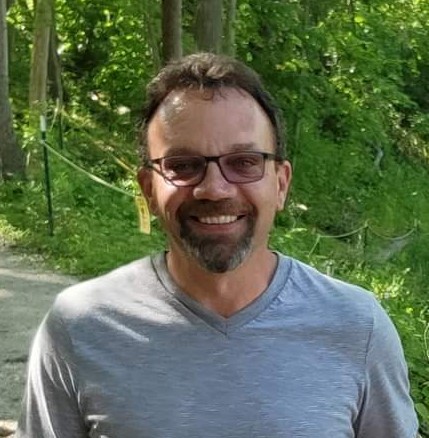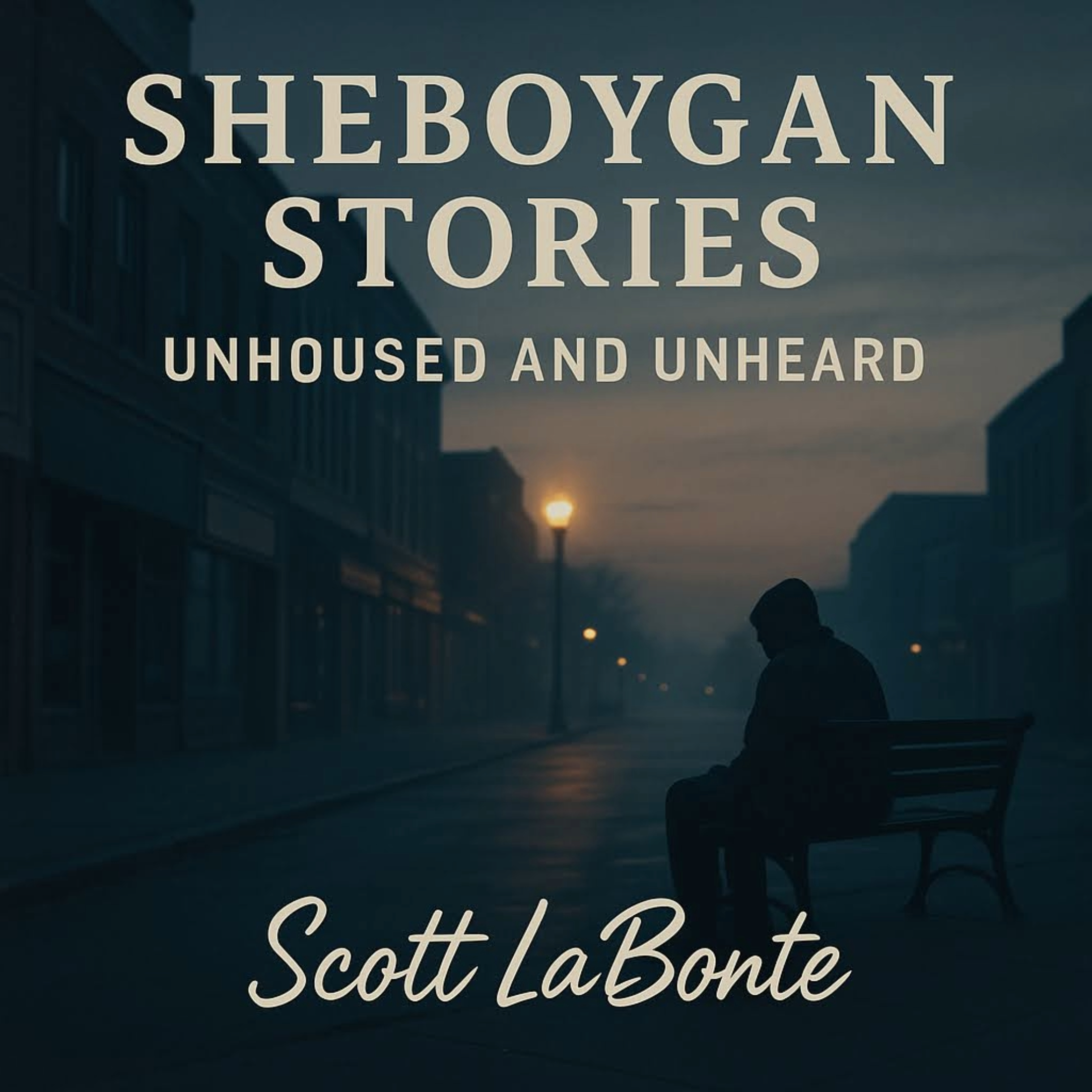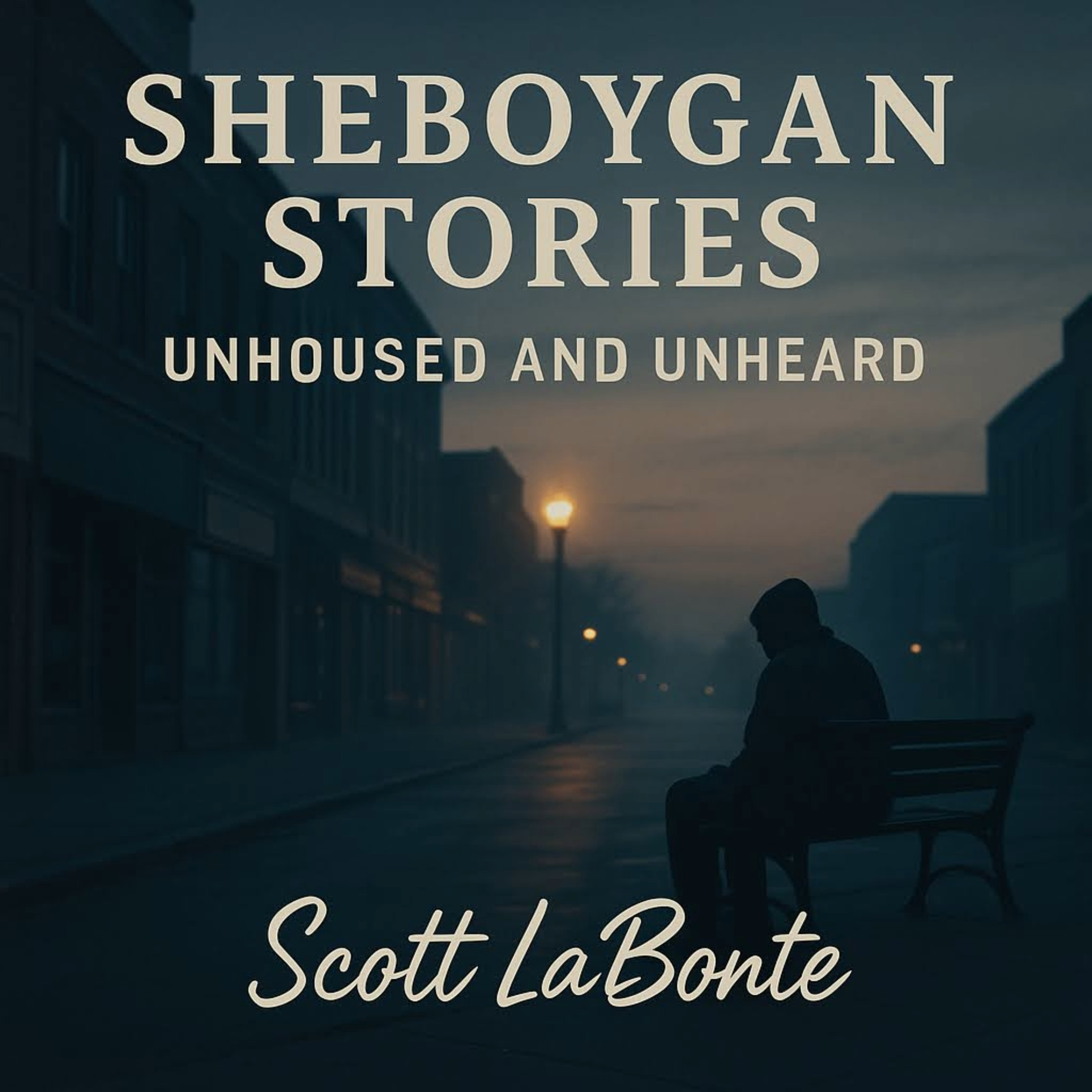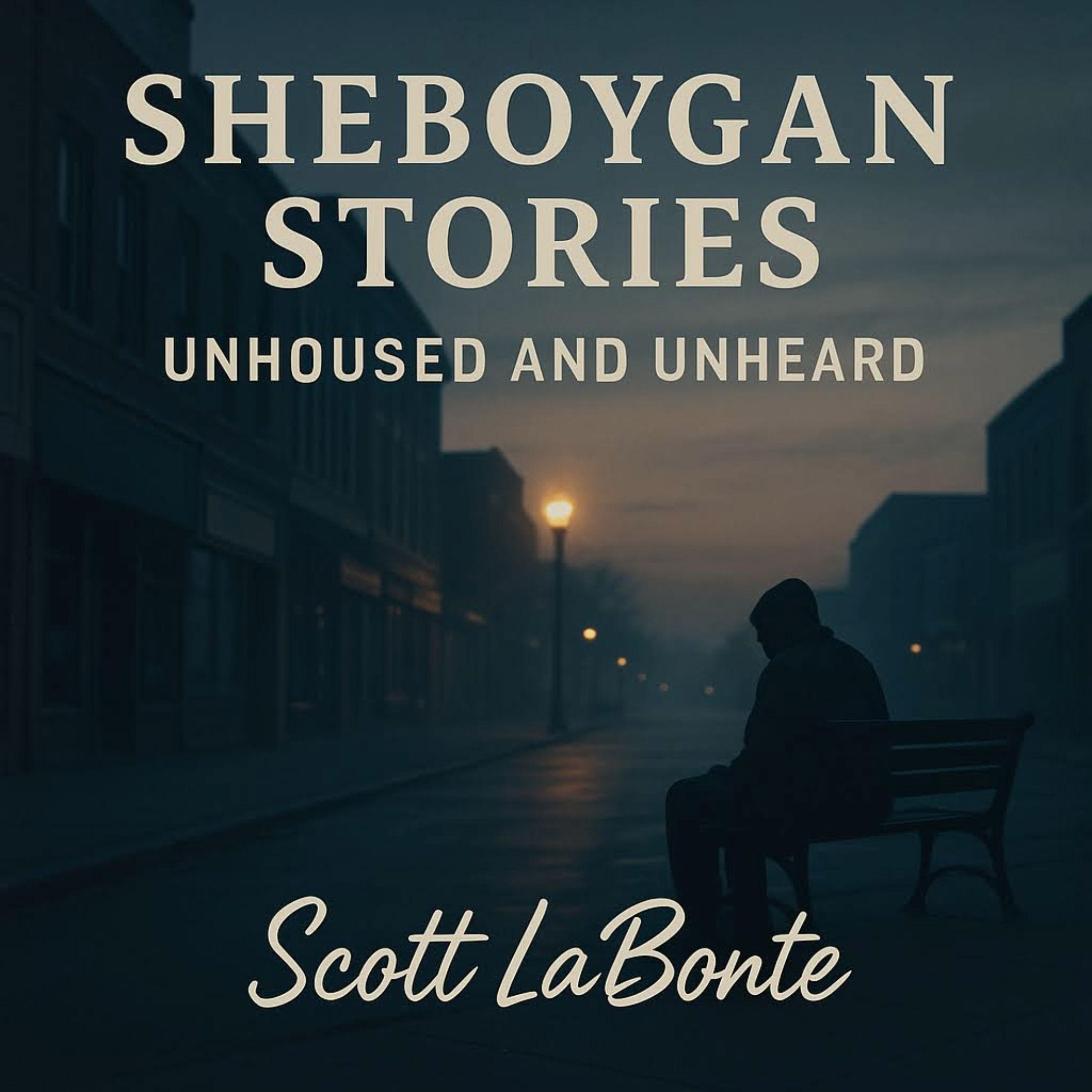Episode Transcript
[00:00:00] Speaker A: Foreign.
Welcome back to Sheboygan Stories and House and Unheard. I'm your host, Scott labonte.
Today's episode is called Mom First, Homeless Second.
We're sitting down with a mom who's navigating something no parent should ever have to raising her kids without a permanent place to call home.
We'll talk about what daily life looks like, what the community gets wrong about family, homelessness, and the kind of strength it takes to keep going for your kids no matter what.
Before we get too deep, could you start by introducing yourself a little and maybe share a little bit about your kids and what life looks like for your family right now?
[00:00:56] Speaker B: My name is Ashley Blaine. I'm a single mom of two boys.
The struggles that we have is that we have to find a place to go and it's hard, but we actually face our challenges and we can do it.
[00:01:09] Speaker A: You sure can.
You've shown that resilience and I've known you for a while now and I've definitely seen that.
So how old are your kids?
[00:01:20] Speaker B: They're seven and eight.
[00:01:22] Speaker A: Seven and eight, wow. That's gotta make it tough.
What kind of things do they enjoy doing?
[00:01:26] Speaker B: They like playing with their friends.
Before we came up here, they had a long. They had friends down in West Bend and they got to hang out with them and do things and hang out with their grandparents. And now we're up here and it's hard, right?
[00:01:40] Speaker A: Yeah.
So could you walk us through what a typical day looks like for you.
[00:01:45] Speaker B: And your kids when they go to school Monday through Friday, I get them up when our normal time is at 6:30 in the morning. I have to get them up. It's kind of a struggle getting them up, but they can do it.
And then take them to get down downstairs, have breakfast and then we go out and wait for the bus and the bus comes around between 7:45 and 8:00 clock. And then they go to school and I do what I gotta do until they get done. And then 2:30 I come back up to where we're staying at and wait for them to get off the bus after three.
[00:02:21] Speaker A: And you're currently at the Salvation army, correct?
[00:02:23] Speaker B: Correct.
[00:02:23] Speaker A: Okay.
So what are some of the biggest challenges that you face while trying to keep a sense of normalcy for you and your kids?
[00:02:34] Speaker B: Finding out where we're going to end up going next, it's kind of hard knowing that this program with the Salvation army is only a three month program and it's kind of hard to find out where we're gonna go next.
[00:02:45] Speaker A: Right. In three months. And you've been there for a little while. So your time is coming up just as the weather starts turning cold again.
[00:02:52] Speaker B: Yep.
[00:02:53] Speaker A: Naturally.
Is there anything people might be surprised to learn about how much effort it takes just to get through a regular day in your situation?
[00:03:03] Speaker B: It's very difficult. It's like I'm struggling on trying to figure out where we're gonna go, and it's hard on the kids and it's hard on me. And it's like I want to give up, but I don't.
[00:03:13] Speaker A: Right.
I don't think people understand that, you know, that's something that not a lot of people, I guess, really think about, you know, unless they're in that situation.
[00:03:24] Speaker B: Yeah.
[00:03:28] Speaker A: Parenting is tough in any situation, but doing it while experiencing homelessness takes incredible strength.
What helps you stay strong for your kids when things get hard?
[00:03:37] Speaker B: I put it into God's hands. Like, I go to church on Sundays and I think I ask God, like, hey, I need your help. Guide me through what we need and everything else. And then I go and I talk to friends and family and see if they know what I come. Give me some advice on what I can do.
[00:03:58] Speaker A: Right. Do you get any?
I know, like, with a lot of the people that we've dealt with and that through Pay It Forward, we found that overall, it's a pretty close knit community.
[00:04:08] Speaker B: Yes.
[00:04:09] Speaker A: Are there other unhoused people that give you tips and tricks and try to help you kind of navigate the days?
[00:04:17] Speaker B: There's resources that are out there that you can call upon and help try to help you out there. And it's hard on the weekends because nobody's available on the weekends, and it's kind of hard.
So I pretty much have to wait until, like, during the week to find. To talk to somebody about what I can do and stuff.
[00:04:35] Speaker A: Right.
If anybody's wondering what that noise in the background is, we're up on third floor of the Mead Library here in Sheboygan, setting up wherever we can and meet people wherever they're at.
Do your kids ever ask you why you don't have a home right now?
[00:04:51] Speaker B: Yes, they do. They do it every day. Like, mom, where are we going to sleep? Where are we going to go? They even did that when we were back in West Bend. They asked me where we're going to go and stuff.
[00:05:03] Speaker A: How do you handle it as a mom?
[00:05:06] Speaker B: Well, I just say, like, we take it step by step, day by day, and we just go from there and see what we can do. Just keep our heads up. And just keep going.
[00:05:17] Speaker A: Right.
Can you share a moment where your kids made you proud even in the middle of all of this chaos.
[00:05:28] Speaker B: When they are been doing well in school?
Because I just. The other one has a problem, but he's getting there and he's learning, and he's showing me that he can do it, even though he doesn't want to, but he'll do it. And the other one, he goes like, hey, mom, look what I did. And he brought an award home. So I was like, okay, that's cool.
[00:05:48] Speaker A: That is awesome. Yeah, that is definitely awesome. I know when I was in school, I absolutely hated it. And then I grew up and became a teacher, which made no sense to me, but, you know, but that. That is definitely awesome.
One thing that I've seen a lot is how misunderstood family homelessness is. Have you ever felt judged, maybe by other parents, teachers, people in the community?
[00:06:13] Speaker B: I have been looked at and judged, and everybody's been like, how can you be a single mom and not have the help that you need with your kids? And I'm like, oh, I do, but that's in a different state. So it's, like, kind of hard. But, you know, I think, like, you know, work on it together. And, like, if you want to judge me, keep it to yourself. I don't judge people like that.
[00:06:35] Speaker A: Well, absolutely not.
[00:06:36] Speaker B: Not until I know what they went through. And if I don't know what they went through, I sit there and I listen to them, and then they're like, well, I was like, I know. I never went through that, but I feel sorry that you went through it. But I don't go out there and judge anybody like that.
[00:06:51] Speaker A: You know, the old adage rings true. You know, don't judge until you walk a mile in their shoes. Yeah, but there's a lot of judgy people, and I find that, you know, with the pay it forward stuff, with the podcast stuff, I find a lot of people are quick to judge. And that's one of the things I'm hoping to get past a little bit with this, is educate enough to get past that judgment, to realize, you know, that we are people and we don't need to be judged.
[00:07:16] Speaker B: No.
[00:07:18] Speaker A: What do you wish people understood.
Excuse me. About moms who find themselves in your.
[00:07:23] Speaker B: Situation, not to, like, judge the moms that are single, even if they're single parents and they're moms and they have kids and stuff, don't judge them. Like, if you want to know what's wrong, just ask them. And if they don't want to say anything, then walk away. Don't judge them for what they're doing, because there are moms out there that are single moms that are struggling, are in my shoes that are struggling and trying to find a place to go with their kids.
And it's like, don't judge them.
[00:07:52] Speaker A: Right. And they're absolutely amazing moms.
[00:07:53] Speaker B: They are.
[00:07:54] Speaker A: Don't judge.
[00:07:54] Speaker B: Don't judge them. They're doing what they need to sacrifice for their kids. And if they got to go somewhere, they got to go somewhere. Like, don't judge them unless you know what they're going through.
[00:08:04] Speaker A: Right.
What kind of programs or resources have actually helped your family?
[00:08:13] Speaker B: I've been contacting, like, the other shelters in the areas in different counties and stuff to see if they can put me on their waiting list, which I am.
And then there's the information.
You can call them for their information, and they can help you find resources and stuff. And so I go there or I call and they help me out. And other shelters, as I said, I was on the waiting list for those, and seeing when you guys did pay for it was a good thing and brought me and my kids back up from being down in the funk area. And then meeting y' all and stuff actually brought us back up a little bit.
[00:08:50] Speaker A: So I have to say, I love you boys. They are amazing.
[00:08:53] Speaker B: Thank you. I appreciate it.
[00:08:55] Speaker A: You've done well, Mom.
[00:08:56] Speaker B: Oh, yeah.
[00:08:59] Speaker A: On the flip side of that, what are some of the barriers or gaps that may have made things harder for you?
[00:09:04] Speaker B: Well, being on the waiting list for the shelters or the shelters are so full, there's.
There's really nothing for anybody can go and do. And it's like. And their churches are closed on Saturday, so it's like you can't contact them to see if they can't help you and stuff. And it's like, oh, God. It's like, what am I gonna do?
[00:09:23] Speaker A: Right.
You know, and unfortunately, you had mentioned, you know, like, the. The waiting list of the housings.
They're long.
[00:09:32] Speaker B: Yeah.
[00:09:32] Speaker A: Excruciatingly long.
You know, and then trying to get in with that waiting, it could be months, could be years.
[00:09:40] Speaker B: Yeah.
[00:09:41] Speaker A: You know, that's tough to try to navigate at that point, too, because how do you, I guess, plan or even try to remotely figure, okay, this is where I'm going to be or this is what I'm going to do when you don't know even when you're gonna be able to get in? That's, you know.
[00:09:57] Speaker B: Yeah. That's just sad. Like, I get it. There's a waiting list and everything else. But what are you supposed to do in the meantime?
[00:10:05] Speaker A: Right.
[00:10:06] Speaker B: Until you can get into somewhere?
Like, are you supposed to go from, like, shelter to shelter to shelter until you're able to get. What are you supposed to do?
Because that's what I'm trying to figure out. It's like, what are you supposed to do if you gotta wait a month, a year or longer?
[00:10:21] Speaker A: Right.
[00:10:21] Speaker B: What are the people supposed to do?
[00:10:23] Speaker A: Wow.
[00:10:24] Speaker B: Right.
[00:10:25] Speaker A: And I know, like, the housing. Like, to get into any kind of permanent housing here, it's literally years.
You know the numbers. You're in, like, three, four, hundreds of people waiting.
[00:10:36] Speaker B: Yeah. And it's sad. Like, you know, there are people that are out there that need a place to go, and if they're on that waiting list, that's sad.
Like, I know I'm on the waiting list, but I know I'm not up here, though. I got two different.
I have two different counties that I applied for, and I'm on their waiting list still.
[00:10:55] Speaker A: Okay. So you're looking to get out of the area?
[00:10:57] Speaker B: Yeah, that's what I'm trying to do, actually. I'm trying to get out of the state. That's what I'm trying to do right now because I have family in Florida, so that's where I'm trying to go.
[00:11:04] Speaker A: Nice.
I hope it works out. And, you know, not that I want to see you go anywhere or, you know, I just want what's best for you and your family.
[00:11:14] Speaker B: Thank you. I appreciate it.
[00:11:18] Speaker A: If you could wave a magic wand and change one thing about how our community supports families in crisis, what would it be?
[00:11:28] Speaker B: That's kind of hard because, you know, everybody's trying their best out there to help one another, and it's kind of hard because there's so many people that are out there on the streets, and it's hard to wave it onto one person when there's everybody that's trying to find somewhere to go to put their heads instead of sleeping on the streets and stuff.
[00:11:49] Speaker A: Right. Unfortunately, there is no magic cure for it.
[00:11:52] Speaker B: There isn't.
[00:11:53] Speaker A: We've been in multiple meetings. You know, we work with multiple organizations and trying to figure the best possible solution or the quickest possible solution, and there really. There isn't one.
[00:12:04] Speaker B: There isn't.
And it's sad seeing all these people out there.
[00:12:09] Speaker A: It is. And it seems like the number's growing.
[00:12:11] Speaker B: It is.
And that's sad.
[00:12:13] Speaker A: It is.
Despite everything you faced, you're still out here doing your best. Every day. What gives you hope right now?
[00:12:23] Speaker B: Looking at my kids and talking with my family to see how far they actually are, trying to help us as well, trying to get us out of here and stuff. So I've been looking at them and looking at my kids and going like, you know what? We can do it. Let's just keep our heads up and let's keep moving on.
[00:12:39] Speaker A: Absolutely. Just, you know, day by day. Make it through today. Tomorrow, wake up. Make it through tomorrow.
[00:12:46] Speaker B: Yeah.
[00:12:49] Speaker A: If you could speak directly to other moms who are in the same boat, what would you tell them?
[00:12:55] Speaker B: I would tell them, don't give up. Take it day by day. Like, don't be sitting there going, like, what did I do? Why did I deserve this? Just take it day by day. Like, say, go. Like, if you're, like, out there on the streets and you're trying to figure out, okay, where my next meal is or something with your kids, just think and then go do.
Because there are moms everywhere I know. That are out there single and have kids and they're homeless. Like, go out there. You can do it. If you do it day by day by day and just look at your kids go like, wow, I can do it. Do it right.
[00:13:31] Speaker A: And know that you don't have to do it alone.
[00:13:33] Speaker B: Yeah.
[00:13:34] Speaker A: You know, there are supports in place. There are people that want to truly help.
[00:13:39] Speaker B: Yep.
[00:13:40] Speaker A: You know, please don't try to navigate it alone.
[00:13:42] Speaker B: No, don't fight it alone.
Find somebody that is willing to help you and do it. And if they can't, just keep going at it until you get what you need.
[00:13:53] Speaker A: Right. Yeah. This world is hard enough. You don't need to try to do it alone.
[00:13:56] Speaker B: No, you don't.
[00:14:00] Speaker A: And finally, I guess, what would you say to people listening who might assume that being homeless means being a bad parent?
[00:14:08] Speaker B: You're not a bad parent. If you're homeless with kids, you're not a bad parent. You're just doing what you have to do for your kids. And if that's to be homeless, then so be it. Just don't. And again, I said before, don't judge them. There are people that are out there that are homeless. Even if they have kids or don't have kids, they're still homeless out there. Don't judge them. Just sit down and talk to them.
[00:14:29] Speaker A: Right. You know, and we had talked a little bit prior to turning on the mics and stuff about that doesn't define you. That's not who you are. It's a circumstance you're going through it's not.
It's not you. It's not, you know, and that's one of the things that I'm really trying to get people to understand. It's not.
It's not who you are. It's just. I don't know. And it's frustrating, you know, And I've mentioned it multiple times in different episodes and stuff. And a lot of it, I think, is why it's so intimidating or judgmental by other people is lots of people realize that they're one crisis away from being in the same predicament I know I am. You know, somebody else's crisis may need to be way bigger than mine is.
[00:15:18] Speaker B: Yeah.
[00:15:19] Speaker A: But it takes one crisis, one misstep, and you could end up in the same boat. And that, I think, scares a lot of people.
And at least, you know, maybe I'm wrong. Maybe, you know, but in my naive little world, in my own little world, I like to believe that that's why people are so judgmental, and that's why they're so taken back by it, because they know that it wouldn't take much to be in that situation.
Maybe I'm wrong, you know, maybe I'm way off base, but I guess I like being in my own little naive world. You know, people are nicer.
Is there anything else you'd like to add?
Mike is yours. You can.
[00:16:04] Speaker B: Like, if you see people out there, just give them your time. If you have time, give them your time and listen to their stories, because it changes everybody. Like, don't go over there and just go like, oh, look at that mom. She's single and she's got her kids out there. She must be a bad mom. Don't do that. Don't judge them.
Just.
You don't know what they're going through unless you've been in their shoes. And if you have, then you understand. And if you don't, don't judge them. Keep it to yourself. If you have nothing nice to say, don't say anything at all.
Because I've learned that from my family. If you have nothing nice to say, don't say anything.
[00:16:42] Speaker A: Right. You know, and we find that that's a very common theme throughout all of these podcasts or even, like, everybody that we've met through Pay it Forward and stuff, say hello. You know, if you pass somebody on the street, if somebody's sitting, you know, I notice we drive through town a couple nights a week just to kind of check in with everybody and say hi and this. And there's usually a pretty Good crowd outside the library or, you know, other places around town and stuff.
Stop and say hi.
[00:17:11] Speaker B: Yeah. That's all you gotta do is say hi. And if you see that they're sad or they're down, say hi. They might give you a high back.
[00:17:20] Speaker A: Absolutely. Don't cross the street. Don't. You know, nobody's gonna bite you. No, you know, I promise nobody's gonna bite.
[00:17:25] Speaker B: No.
[00:17:26] Speaker A: You might actually, you know, heaven forbid, learn something. You might. You might walk away with an entirely different perspective, you know, and I've said, too. And you know, I apologize to anybody who listens to these regularly how much I repeat, but I forgot where I was going with that. Imagine that.
[00:17:45] Speaker B: Or if you smile at the person, they might smile back. Right back at you.
[00:17:49] Speaker A: Right. You know, oh, now I got shiny things. Brain, you know, brain goes someplace else. It takes leave every once in a while.
You know, I had mentioned that, you know, like, about acknowledging people and just saying hi or stopping this and not crossing the road, you know, and nobody's going to bite you.
When we had our space out on Erie Ave. Before the city condemned the building and stuff like that, I've often told people, because people always use to ask me, why do you do this? You know, you don't have to, you.
[00:18:19] Speaker B: Know.
[00:18:22] Speaker A: And I tell them, some of the most amazing people I've ever met was within those four walls.
The strength, the resilience, the determination would be crippling for 90% of the people outside of there.
[00:18:48] Speaker B: Yeah.
[00:18:49] Speaker A: And it truly is inspiring to me. It is amazing.
[00:18:54] Speaker B: Oh, yeah.
[00:18:55] Speaker A: And I've met many wonderful people that I now truly call my friends because of that.
And all it takes is the time to acknowledge somebody and say hello.
[00:19:07] Speaker B: That is true.
[00:19:08] Speaker A: You know, you might walk away with an entirely different perspective.
[00:19:13] Speaker B: Oh, yeah.
[00:19:16] Speaker A: All right, so on that note, thank you so much for being willing to share your story with us. Of course it's not easy to talk about these things, but your honesty helps break down the walls of the stigma and the misunderstanding that many families face.
To our listeners, remember, homelessness doesn't always look how you expect.
Sometimes it's a mom doing everything she can to keep her kids safe, fed, and loved.
If this conversation moved you, share this episode and keep these stories alive. Talk to somebody about it. Share it.
You can find Sheboygan stories on house and unheard on all major podcast platforms.
Until next time, keep your heart open and pay it forward.
[00:19:58] Speaker B: Sam.




